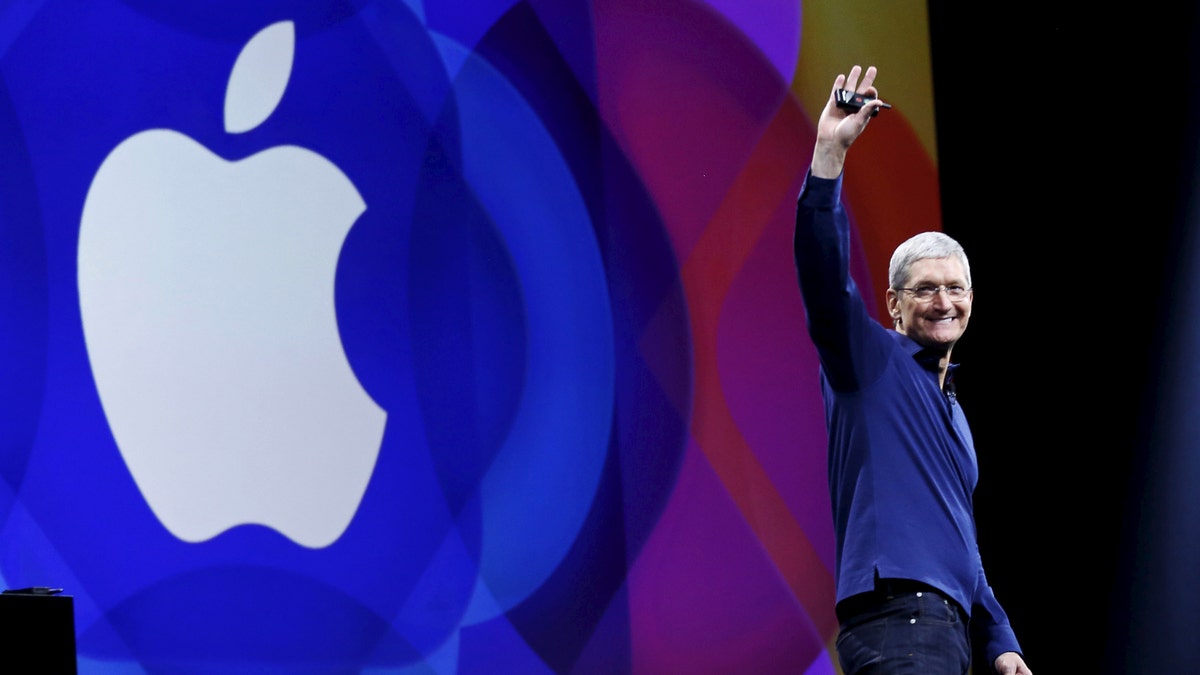
Apple CEO Tim Cook waves as he arrives on stage to deliver his keynote address at the Worldwide Developers Conference in San Francisco, California, United States June 8, 2015. (REUTERS/Robert Galbraith)
Apple’s decision to fight an order to help hack the phone of a shooter in the deadly terror attack in San Bernardino, Calif., is a PR masterstroke, say marketing and technology experts.
“Tim Cook and his team made the right choice in laying all the cards on the table," marketing expert and President of JRM Comms Jason Mollica told FoxNews.com, via email. “Apple let their customers and the general public know exactly what the situation was, how it could affect them, and why Apple could not support what the government was asking.”
Related: Apple ups the ante in Silicon Valley's encryption battle with government
The tech giant announced Wednesday that it will fight a federal magistrate's order to help the Obama administration break into an encrypted iPhone belonging to one of the shooters in last December's San Bernardino attack that killed 14 people.
Mollica noted that Apple’s tough stance will resonate with consumers. “There are many that agree with Cook's words and will continue to trust Apple's products,” he told FoxNews.com. “Again, transparency is something that people appreciate.”
Related: John McAfee vows he can break iPhone encryption, promises to eat his shoe on live TV if he can't
Suni Munshani, CEO of data security specialist Protegrity, also applauded Apple’s decision.” It is the right stance to take because caving in to the government’s demands would have extraordinary implications for millions of iPhone customers around the world,” he explained, in a statement emailed to FoxNews.com. “While I have empathy for victims and the families who have suffered great loss, it is regrettable that the actions of a few terrorists have brought us to think we must decide between personal privacy versus national security.”
Social media giants Facebook and Twitter have backed Apple in its dispute with the FBI, as has Google CEO Sundar Pichai. “Forcing companies to enable hacking could compromise users’ privacy,” he tweeted Wednesday.
1/5 Important post by @tim_cook. Forcing companies to enable hacking could compromise users’ privacy
— sundarpichai (@sundarpichai) February 17, 2016
In a statement posted on Apple's website early Wednesday, CEO Tim Cook said the order by U.S. Magistrate Judge Sheri Pym "has implications far beyond the legal case at hand."
Related: Legendary iPhone hacker weighs in on Apple's war with the FBI
The ruling by Pym, a former federal prosecutor, requires Apple to supply highly specialized software the FBI can load onto shooter Syed Farook’s county-owned work iPhone to bypass a self-destruct feature, which erases the phone's data after too many unsuccessful attempts to unlock it. The FBI wants to be able to try different combinations in rapid sequence until it finds the right one.
"The FBI may use different words to describe this tool, but make no mistake," Cook wrote. "Building a version of iOS that bypasses security in this way would undeniably create a backdoor. And while the government may argue that its use would be limited to this case, there is no way to guarantee such control."
Related: Use the dead to open an iPhone? Apple vs. FBI is getting weird
Michela Menting, digital security research director at ABI Research told FoxNews.com that the creation of a tool bypassing the self-destruct feature could have far-reaching consequences. “I think it’s a dangerous line, and once breached, we are on a slippery slope,” she told FoxNews.com, via email. “What is to stop other governments from asking the same from Apple?”
“Requesting Apple to produce such a tool will inevitably result in two things: further requests down the road for providing more backdoors in other tools based on this precedent (including encryption), and, consequently, the slow and inevitable undermining of privacy as we know it today,” added Menting. “It may also mean that the U.S. tech industry moves abroad to more favorable governments (maybe Israel or Switzerland).”
Related: Does Apple even have the ability to hack the iPhone like the FBI wants?
America’s tech titans have already voiced their concern about creating so-called “backdoors” into encrypted devices for government. In the wake of the Paris terror attacks last November, the Information Technology Industry Council (ITI), which includes Apple, Microsoft, Google, Facebook and Twitter, rejected calls for weakened encryption.
Apple has been granted a three-day extension to Feb. 26 to respond to the court order to help unlock Farook’s iPhone 5c.
Related: Use the dead to open an iPhone? Apple vs. FBI is getting weird
While Apple has garnered plenty of support for its stance, the Cupertino, Calif.-based firm has also been criticized by the families of victims in the San Bernardino attack.
The Associated Press contributed to this report.
Follow James Rogers on Twitter @jamesjrogers
